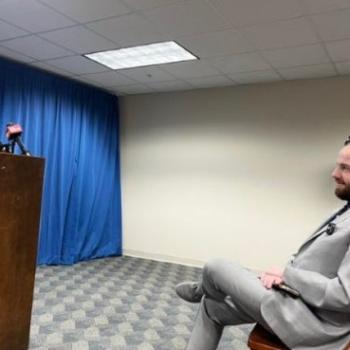 We have been shocked and saddened anew at what occurred this past Saturday at an Arizona supermarket. Six were killed and another fourteen wounded by the gun of 22-year-old Jared Lee Loughner. The mental state of the shooter is obviously a relevant and grave question that will be investigated in days to come. Nonetheless, the events have shone a dark but illuminating light on the divisions, discord, and anger in our society, from all sides of our political and ideological factions.
We have been shocked and saddened anew at what occurred this past Saturday at an Arizona supermarket. Six were killed and another fourteen wounded by the gun of 22-year-old Jared Lee Loughner. The mental state of the shooter is obviously a relevant and grave question that will be investigated in days to come. Nonetheless, the events have shone a dark but illuminating light on the divisions, discord, and anger in our society, from all sides of our political and ideological factions.
Pima County Sheriff Clarence Dupnik has blamed "the vitriolic rhetoric that we hear day in and day out from people in the radio business and some people in the TV business." Furthermore, he has suggested that now may be the time to take a deep, reflective look at our society. In a Huffington Post essay, "We Have Seen the Assassin and He is Us," Mike Hegedus suggests that this tragedy has simply ripped off the "gauze that covers our wounds." We need to take a long look in the mirror, he says, because the root problem is with us. This seems right. A free society should not mean freedom from responsibility and duty; certainly not from the responsibility to try to get at the heart of what ails us.
My purpose in this essay is not to genuflect before the politics of society at large—issues like gun control, immigration, health care, and so forth (issues worthy of discussion)—nor is it to try to get to the bottom of the American social condition. Instead, I want to consider the distinct role for the Christian church in the deep self-reflection this tragedy calls forth by commending a timely and timeless resource: Dietrich Bonhoeffer's Life Together: The Classic Exploration of Christian Community. This book was written in 1938, during his time as leader of an underground theological seminary in Hitler-led Germany. Political tensions had obviously been extremely high and mistrust, anger, fear, and violence had become the order of the day.
Christian community, as Bonhoeffer defined it, "means community through Jesus Christ and in Jesus Christ. No Christian community is more or less than this . . . we belong to one another only through and in Jesus Christ" (p. 21). Christians find their identity not through their own intellect, prowess, social power, self-achievement, or ideological identity. Rather, they die to themselves, live in submission to the Word of God, and die to themselves so as to live for each other. Christians are bound to each other solely through their common redemption in Christ. Thus, "not what a [person] is in himself as a Christian, his spirituality and piety, constitutes the basis of our community. What determines our brotherhood is what [that person] is by reason of Christ" (p. 25).
Christian community is not some lofty ideal, but an objectively real "divine reality" (p. 26). This means that when we experience disillusionment with another individual in the community, when fragmentation occurs, all that is destroyed is the illusion of a utopian, harmonious existence. The reality—a real community of sinners saved miraculously by God's grace—remains intact. God's redemption is real, sure, and extends to the greatest of sinners and to the "least of these." Our sins, misunderstandings, and offenses to and from each other become salvific because they are reminders that none of us "can ever live by our own words and deeds, but only by that one Word and Deed which really binds us together—the forgiveness of sins in Jesus Christ" (p. 28).
In true Christian community, Jesus Christ stands as the middle term, or the mediator, between one person and another. Spiritual love is the continual commendation of Christ, the persistent, humble witnessing to the primacy of Christ's salvation for each other and for the world. This means that our identity as followers of Christ (and as participants in the Church, the mystical body of Christ) takes primacy over all other identities: whether political, social, national, or ideological.
Not long ago, I heard a stirring message by Samuel Rodriguez, President of the National Hispanic Christian Leadership Conference, and outspoken leader on comprehensive immigration reform. His challenge to Christians (and I'm paraphrasing) was that every day, when we look in the mirror, we should see first a follower of Jesus. Our primary identity is Christian; all secondary identities are just that, secondary. And yet, it's necessary to point out that personal identity is complex and intricate. It is impossible to cull out, for example, social, ethnic, and gendered aspects from the religious. In fact, it may be detrimental to ourselves and to our constructive role in society to do so. Avoidance or minimalization of genuine difference is not healthy and can even contribute to the kind of violence we saw in Tucson.





